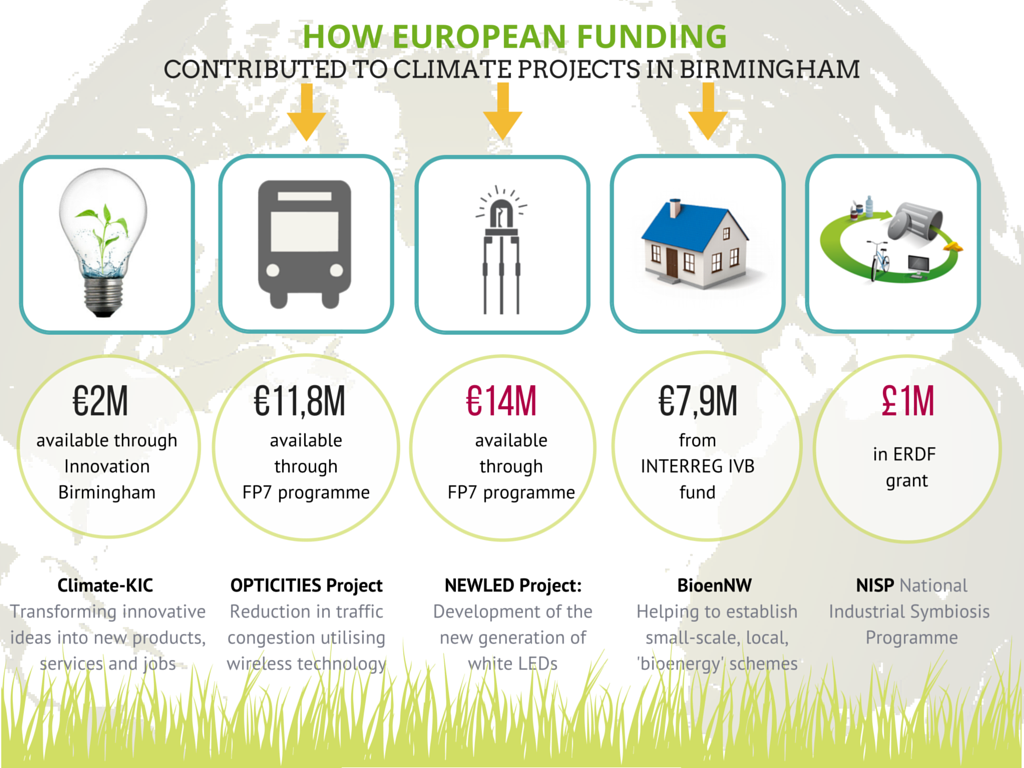Climate change is a global issue we cannot afford to ignore. Birmingham City Council has set itself an ambitious aim of reducing CO2 emissions by 60% by 2027 compared against levels from 1990. The Council has set out a Green Commission outlining clear priorities for the city:
- Accelerating investment in how we heat and power Birmingham;
- Creating more local renewable energy;
- Improving city transportation; and
- Widening our investment in building energy efficiency programmes.
For more information about Birmingham City Council’s Sustainability Team, please take a look at their website here.
The targets that the City of Birmingham has set itself are reflected in the projects, for which a significant part of funding comes from the EU. If fully realised these initiatives jointly will bring billions of economic benefits for the region, generate and safeguard thousands of jobs and allow us to tackle important environmental issues (i.e. reduce the carbon footprint, increase energy security, improve resource efficiency and productivity).
Spotlight on projects helping Birmingham to reach its targets:
The infographic above represents 6 major projects funded through such EU schemes as Framework 7 Programme, European Regional Development Fund ERDF, INTERREG IVB and implemented in with the participation of Birmingham universities and businesses.
- European funding was used to part-finance National Industrial Symbiosis Programme (NISP), a model developed by Birmingham-based firm, International Synergies Ltd that has achieved £280 million economic benefits, generated 3,269 jobs in the West Midlands and reduced the carbon footprint of the area by the equivalent of over 5 million tonnes of CO2.
- Climate Knowledge and Innovation Community (KIC), created in 2010 by the European Institute of Innovation and Technology, addresses climate change mitigation and adaptation. A €100m+ grant is used to create new partnerships between research, business and technology and supports 12 hubs of climate change activity across 10 countries. The grant brings tangible benefits to Birmingham in terms of new products, services, jobs and increased investment. In 2015 Innovation Birmingham hub was allocated €2 mln. to deliver a range of initiatives for Climate-KIC.
- Opticities is funded through the Seventh Framework Programme and aims to help Birmingham and other European cities tackle complex mobility issues. The research from the project is feeding into Birmingham’s transport strategy, Birmingham Connected, and will help to reduce traffic disruption around Birmignham utilising wireless technology.
- BioenNW project, funded through INTERREG IVB scheme, was led by Aston University in cooperation with 11 European partners. Its aim was to offer support to bioenergy ideas and innovations and to increase the rate of bioenergy provision within North West Europe through facilitating the implementation of local, small scale bioenergy plants.
- NEWLED is a €14 million research project with the power to reduce global energy consumption by 10% through development of the new generation of white LEDs. The project is led by Aston Institute of Photonics Technology and involves leading industry and academic partners from across Europe.
Future prospects
Birmingham City Council is a partner in the Public Procurement of Innovation in Action Network (PPIA) and the Smart Procurement European Alliance (SPEA) projects. For the continuation of its work on these public procurement innovation projects the city has received €1.2 million from Horizon 2020 funding.





